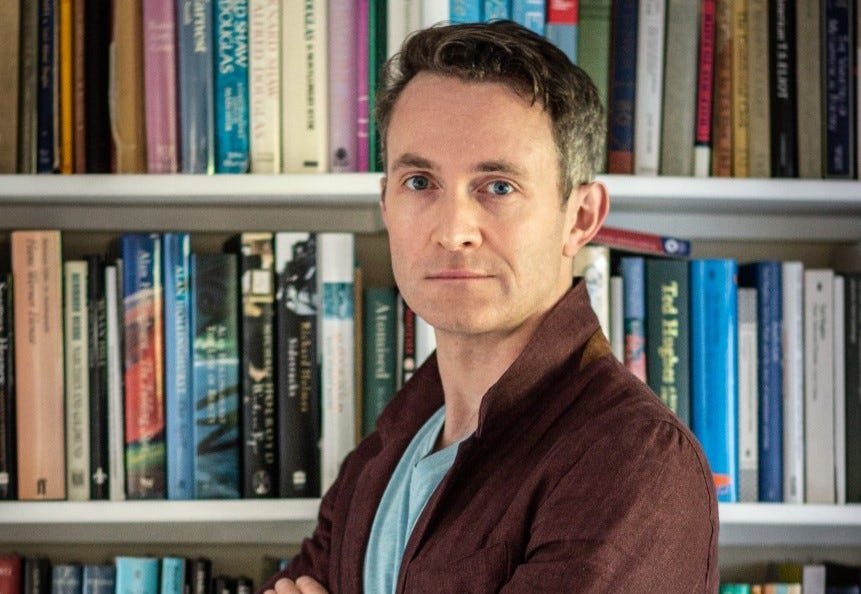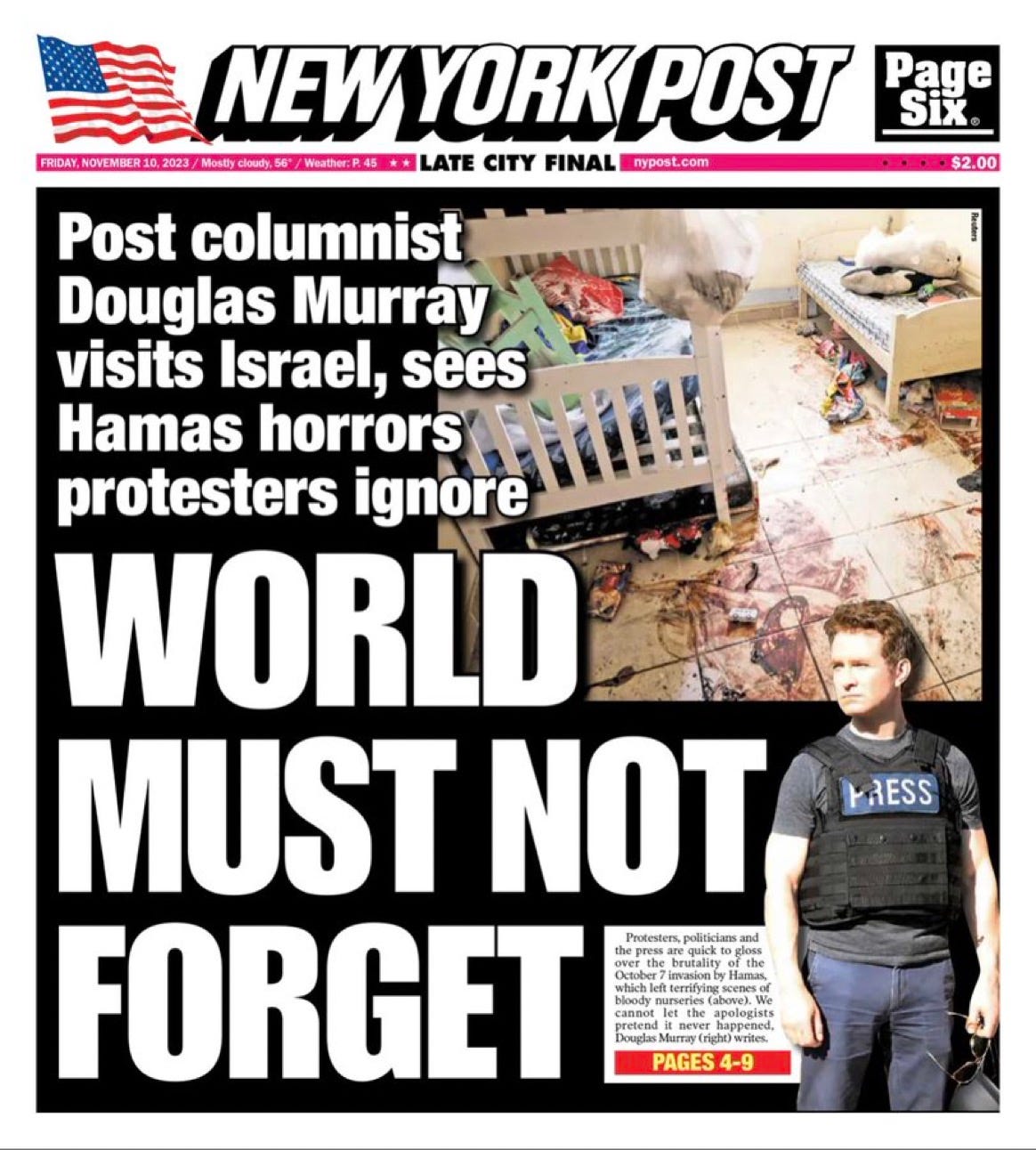Douglas Murray's Israel-Gaza Coverage is Vanity at a Bonfire
The Spectator's associate editor is no foreign correspondent
When George Orwell returned from volunteering to fight in the Spanish Civil War, he struggled to get his journalism published because of the criticisms it made of his “own side”. No such trouble will befall Douglas Murray, the associate editor of The Spectator and author of stirring tomes such as ‘The War on the West’.
Murray’s dispatches on the war in Israel and Gaza, published in the New York Post and The Sun, contain less scrutiny of Israel’s conduct of the war than you would read in the Israeli press. I’m afraid this is the least of his journalistic failures.
Usually, when a reporter travels to a warzone, their photographer takes pictures of the conflict. Murray took photos of himself. In his first piece for the Post (November 9th), on a visit to a kibbutz where Hamas slaughtered hundreds of civilians, three of the nine photos are of Murray. In the second piece (November 15th), reporting from the war in Gaza, there are four.
We see Murray posing in a flack jacket marked “PRESS” outside the kibbutz (from two different angles), Murray listening to his Israeli guide, Murray in a dugout with an Israeli Defence Force (IDF) soldier, Murray in an ill-fitting helmet with more IDF soldiers, Murray looking pensively at the camera.
The Post was so taken by these photos that it ran one of them on its front page: There’s Murray, in his flack jacket, sun in his pensive face, biceps bulging. You know what they say: Sex sells. (Most of the Murray-less shots are labelled as from the AFP and Reuters wire services, or provided by the IDF.)
Having enticed his readers thusly, Murray gives an account of what he saw at the kibbutz in the style of a tabloid op-ed. It must be a style issue that prevented Murray from including any quotes from the people he spoke to there — again, boldly breaking with the conventions for a war reporter. The first piece, at the kibbutz, includes one short quote from his guide. In the second piece, (perhaps growing in confidence), Murray decided to dispense with quotes altogether.
This is odd, since he has clearly spoken to the IDF at length. As he writes: “At one hour’s notice the IDF yesterday morning gave permission for a small number of journalists to go into Gaza with them to see the full scale of the war that Israel is waging against the terrorists of Hamas.”
There’s very little in what follows to which his IDF guides could object, from Hamas terrorists hiding in tunnels, to humanitarian corridors that “the Israelis have set up to allow Palestinians to leave the zone of the most intense fighting and get to safety”, to the Israeli siege of the much-contested Al Shifa hospital — where the main crisis appears to be the BBC’s coverage, in Murray’s telling.
These are perhaps quibbles. Here is where we see the real journalistic breakdown: It would be one thing to join the IDF on a press trip and provide insight into Israel’s military campaign. But to fail to mention once, at this stage in the conflict, the thousands of Palestinian civilians killed by Israeli forces, is unforgivable.
Instead we get sentences like this: “One of the first villages we came to had been almost destroyed.” Destroyed, you say? Well, how, and by whom?
Worse than this, on the one occasion where Murray does acknowledge dead Palestinians, he does so as follows. First he muddies the water by claiming that “Hamas have actually been gunning down civilians trying to flee”. I wouldn’t put it past them, but watch closely:
“Roadways like this one have been strewn with the bodies of Gazans trying to follow the IDF’s warning to move south so that Hamas can be isolated in the north. The resulting scene I saw was of course a tide of human misery. But it is a misery brought upon the people of Gaza by Hamas when they decided to break into Israel on October 7 by land, air and sea.”
Of course. As if to hammer the point home, Murray concludes: “All the horrors that are now happening inside Gaza are the result of Hamas’s decision to wage war – even against the people most dedicated to peace.” That “all” gives Israel rather a lot of leeway in the “horror” stakes, and the IDF doesn’t appear shy about using it. Murray didn’t even intone the mantra “within international law”.
How “dedicated to peace” is Douglas Murray? Ahead of his trip to the Holy Land, and before Israel’s counter-offensive really got going, Murray wrote the following in The Spectator on October 14th. Murray has recently proved himself to be a litigious type, so I’ll quote this at length:
“The Israelis will respond as they see fit — it isn’t for non-Israelis to give them advice. Maybe Israel will cut off Gaza and starve Hamas out. Maybe they will have a full-scale military operation to rescue the Israeli captives. Or maybe they will finally put an end to this insoluble nightmare, raze Hamas to the ground, or clear all the Palestinians from that benighted strip. A strip which Egypt owned but nobody wants.
“It would be a good time to do it. Very few countries in the Middle East still pretend to care about the Palestinians. Few ever did. If the Jordanians cared, they’d have taken in all the Palestinians from the West Bank when they lost the last war. The same goes for the Egyptians. Why should the Palestinians forever be Israel’s problem?” (Italics mine)
Good grief. Here we find our reporter musing on what’s known in Israel as “transfer”, a euphemism for ethnic cleansing, which is itself a euphemism for moving people against their will by force. To write like this is to indulge the worst fantasies of the Israeli right, and betrays a monstrous contempt for the Palestinian people and their history. One also can’t help but suspect that the oddly-phrased “raze Hamas to the ground” was a last minute redraft…
Murray’s prep for his travels included calling for “Hamas supporters” in Britain to be deported, (onward destination not specified); spreading news of a fictitious plot by Hamasniks to “defame our war-dead and desecrate the cenotaph”, adding: “the people of Britain must come out and stop these barbarians”; and calling Scottish first minister Humza Yousaf, who has spoken out against the war, “the first minister of Gaza”. Given all of this, his on-the-ground reporting is relatively hinged.
Should Jews be flattered by Murray’s attention? In a piece for the Jewish Chronicle (November 9th), Murray charged that some British Jews were under-reacting to the Hamassacre on October 7th. Having watched footage of that atrocity, he wrote: “this is one occasion when saying that some people are worse than the Nazis is not hyperbole.” Again, I have to quote at length:
“Average members of the SS and other killing units of Hitler’s were rarely proud of their average days’ work. Very few felt that shooting Jews in the back of the head all day and kicking their bodies into pits was where their own lives had meant to end up.
Many spent their evenings getting blind drunk to try to forget. Nazi commanders had to worry about staff ‘morale’. When the war ended, the Nazis tried to pretend that Treblinka and other death camps never existed.”
By contrast, he writes, the Hamas pogromists of October 7th were proud and “elated”. When criticised for this argument, Murray cited Christopher Browning’s 1992 book ‘Ordinary Men’ as one “would-be know-alls might benefit from reading”. Has Murray read the book recently? ‘Ordinary Men’ is not about the SS. It is about one reserve police battalion under SS command which murdered Jews despite some members finding it difficult, precisely because they were not hardened Nazis or killers. To say that Murray is comparing apples with oranges here would be generous. His claim is an obscene historical distortion, lazily deployed to serve a false assertion.
And for what? The real point of Murray’s piece was to single out three journalists, two of whom are Jewish, (The Times’s Hugo Rifkind and Josh Glancy, formerly of the Jewish Chronicle) for being soft. After misrepresenting what they had written, (that aversion to quotes again!), Murray concludes:
“In the 1930s, a different generation of British Jews had the guts to say to a different generation of antisemites, ‘they shall not pass’. Can this generation summon up the same resilience?”
Yeah, come on Jews. Have more “guts”, like Douglas. Don't you realise these people are worse than the Nazis?
I should perhaps say in the interest of full disclosure that I have met Murray a few times over the years, and found him to be friendly and courteous. He once complimented a piece I wrote, proving himself to be a man of refined literary taste. Sadly, mutual friends and former colleagues have watched with alarm at Murray’s evolution. Back then he was advocating democracy in Arab countries and “social cohesion” in Britain. In the years since, he’s moved on to lamenting the decline of a “white” majority in London, and volunteering to explain the popularity of Hungary’s Viktor Orban, Germany’s AfD, France’s Eric Zemmour, and the like.
The common theme appears to be a dread of Muslim immigration, or of a large Muslim minority population. I’m afraid a person afflicted with this problem is not capable of reporting on Israel-Palestine, or on very much at all.
Murray is a talented media performer. As a foreign correspondent, he sucks. When he returns from his travels, Murray will be treated like an expert on the conflict by our furry media. But his attempt to swoop into the Middle East like a far-right Bernard Henri-Levy is a flop, and an act of vanity at a bonfire.
While he styles himself as a rebel, Murray’s secret is to have mastered the art of courageously telling right-wing audiences what they want to hear. Far from speaking truth to power, Murray has become what Orwell would have called a “war propagandist”— a party-line hack who repeats or doubts atrocity stories based on which “side” makes them, sees only a war on “terrorists” as the bodies of children arrive on stretchers, and with a flash of his keyboard can make thousands of victims disappear.
Adam Barnett is UK News Reporter at DeSmog and a freelance journalist. He writes this substack in a personal capacity. Follow Adam on Twitter at @AdamBarnett13






